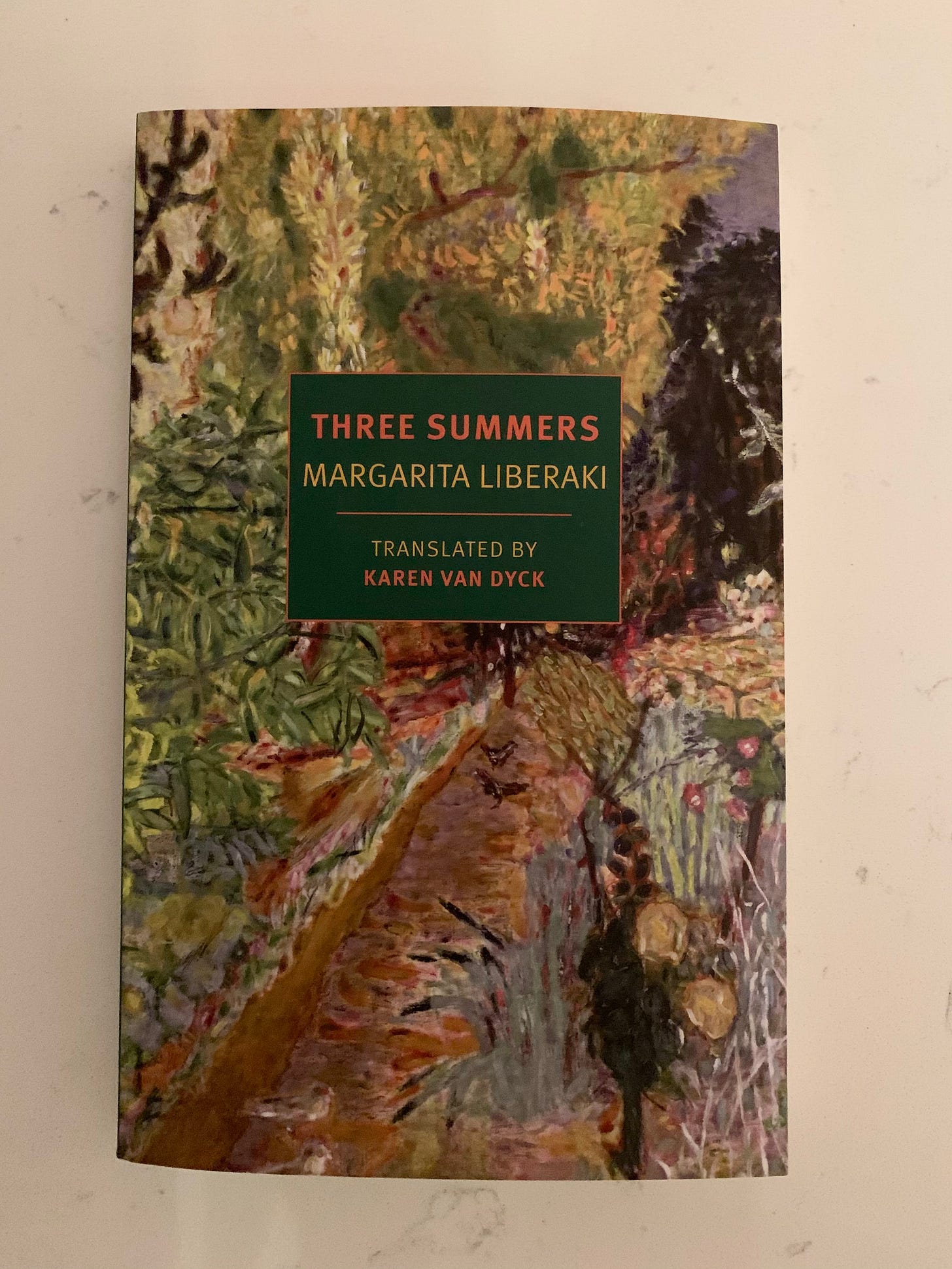'Three Summers' by Margarita Liberaki
'These books talked of a different world, a world for men and women whose dream was not a house and garden but something less concrete and yet more grand.'— Review #148
Apologies to those of you expecting a review of ‘The Dark Dark’ by Samantha Hunt. When I planned this month’s lineup, I didn’t see the really fine print on the cover indicating that Hunt’s book is a short story collection. When I cracked the book open a week ago, I was surprised, like:
So I made a change. I’ll come back to Hunt’s book next year. I’m thinking of doing a month in the spring devoted to story collections. More on that in the future. For now, here’s a review of ‘Three Summers’ by Margarita Liberaki, which is part coming-of-age tale, part feminist awakening and part Melrose Place, which is not a dig because:
Here’s the cover:
If you enjoy this review, click the ♥️ above. New here?
The story orbits around Katerina, the fiercely independent, often petulant and deeply conflicted youngest of three teenage sisters living in an affluent area near Athens, Greece. Over three summers, we follow Katerina as she grapples with wanting to fall in love, yet not become trapped by it. Around her are women in various stages of what she would call submission. There’s her oldest sister, Maria, who recently married and has one child with another on the way. The middle sister, Infanta, rides her horse, Romeo, at full gallop through the fields but not fast enough to free herself from the pull of boys. There’s Aunt Theresa, who never married nor left the family house. There’s Mother, who is divorced and lonely, but is hiding a big secret. There is Mrs. Parigori, Maria’s mother-in-law, who is in love with David, a much younger man Katerina may or may not also be in love with. There is Nina, another older woman chasing after younger men. (See what I mean about Melrose Place?) And there is Katerina’s Polish grandmother, who abandoned the family decades ago and was never heard from again. To Katerina, this act is the epitome of feminine independence, and she examines an old photograph of her grandmother and then looks at herself in the mirror searching for a resemblance. Torn between wanting to see the world, like she imagines her Polish grandmother did, and getting married to David, a twenty-something astronomer with his own observatory atop his family home, Katerina lashes out. She says things to deliberately hurt her family or to make things uncomfortable. I empathized with her; I’m not too old to have forgotten what it’s like to be a teenager who’s confused about love and what you’re going to do with your life. But the intensity and frequency of her outbursts had me like:
Liberaki’s writing style took some getting used to. She uses ellipses in abundance to give the story a dreamlike quality, and she shifts back and forth from Katerina’s first-person narration to a third-person description, which is jarring. Also, I was surprised by the number of typos I noticed in the text, from missing quote marks to additional words. Sloppy editing makes me go:
One thing that struck me about this book is how often thyme appears. Characters are always walking by it, rolling around in it or smelling it on the breeze. I thought this might be a memento mori about how life is short, or maybe a metaphor about the biological clock. Then I remembered that this book was translated from the Greek, and that the homonym probably is unintentional. Even so:
I had never heard of Margarita Liberaki before the New York Review of Books sent me this novel. Reading through the translator’s introduction, I learned that she had lived life similarly to the Polish grandmother in her story. She had a daughter before absconding to Paris to mingle with the likes of Camus and to become a writer. She also changed the spelling of her name to align more closely with ‘liberation.’ She sounds pretty cool, and I was glad I read her book. You might like it, too.
How it begins:
That summer we bought big straw hats. Maria’s had cherries around the rim, Infanta’s had forget-me-nots, and mine had poppies as red as fire. When we lay in the hayfield wearing them, the sky, the wildflowers, and the three of us all melted into one. “Where are you? Off hiding again?” my mother called. Shhhhh. We whispered and told secrets. Other years Maria and Infanta had told the secrets, leaving me out since I was the youngest. But this year…
This year Infanta lay a little farther away, all quiet, and Maria told the secrets to me. She talked and talked, turning this way and that in the hay, her cheeks aflame, her eyes taking on a strange glow. And when I stopped listening, watching the sun as it set or an insect as it made its way to its nest to sleep, Maria would get mad. “Hey, are you interested or not?” she’d ask. “It’s not for my own sake that I’m here, exhausting myself, trying to explain things to you. Go on believing that babies are brought by storks if you want!…”
I was about to answer, to tell her that I knew that babies weren’t brought by storks, that maybe I’d always known this, but her laugh stopped me, a loud, jolting laugh that made the kernels of wheat tremble as it ricocheted off the mountain opposite us and came back an echo. At such moments Maria’s laugh annoyed me. I saw in it a shamelessness that took the mystery and pleasure out of things. Hearing it, I’m not sure why, I thought of the feast day of Profitis Elias last year where I had seen a small child dead, curled up in a jar of alcohol. It was just as it had been in its mother’s womb.
My rating:
‘Three Summers’ by Margarita Liberaki was originally published by Kedros Publishers, S.A. Athens, Greece, in 1995. It was translated from the Greek by Karen Van Dyck. It was published by The New York Review of Books in 2019. 240 pages. $15.59 on Bookshop.org. (Also, NYRB Classics is having a 40 percent-off flash sale on all of its titles. Check it out!)
Disagree with my review? Let me know:
Up next:
Review #147: ‘Their Eyes Were Watching God’ by Zora Neale Hurston
Support BoG: Twitter | Instagram | Goodreads
Contact me: booksongif@gmail.com.
Before you go:
Read this: If you’re looking for some forthcoming releases to add to your 2021 reading list, check out this Medium post by BoG friend Angela Lashbrook. ‘The Most Exciting Reads Of Winter/Spring 2021’ includes a new Jhumpa Lahiri book and ‘several novels about witches.’ One of those witch novels that sounds pretty interesting is ‘Outlawed’ by Anna North. As Lashbrook writes: ‘On the run from her town where barren women are hanged as witches, a 17-year-old joins a band of outlaws who aim to create a safe haven for outcast women.’
Read this, too: Author Alan Dean Foster, who wrote several ‘Star Wars’ novels including ‘Splinter of the Mind’s Eye,’ is suing Disney over unpaid royalties. This piece in The Guardian lays out the case.
RT this: Books on GIF is closing in on its 2020 subscriber goal. You can help by sharing this tweet, which outlines the cool benefits of joining the BoG community. We’d appreciate it!
 Here’s what to expect when you subscribe to booksongif.substack.com: * A Sunday newsletter every 2 weeks * Diverse authors; hidden gems * Links to cool stuff * Virtual event access. Books on GIF is a literary newsletter that's different, like a stingray learning to fly:
Here’s what to expect when you subscribe to booksongif.substack.com: * A Sunday newsletter every 2 weeks * Diverse authors; hidden gems * Links to cool stuff * Virtual event access. Books on GIF is a literary newsletter that's different, like a stingray learning to fly:
Until next time,
MPV
Review #148 used GIFs from Giphy.com.
Books on GIF newsletters with most ♥️s














Melrose Place references ANND an X-Files gif???